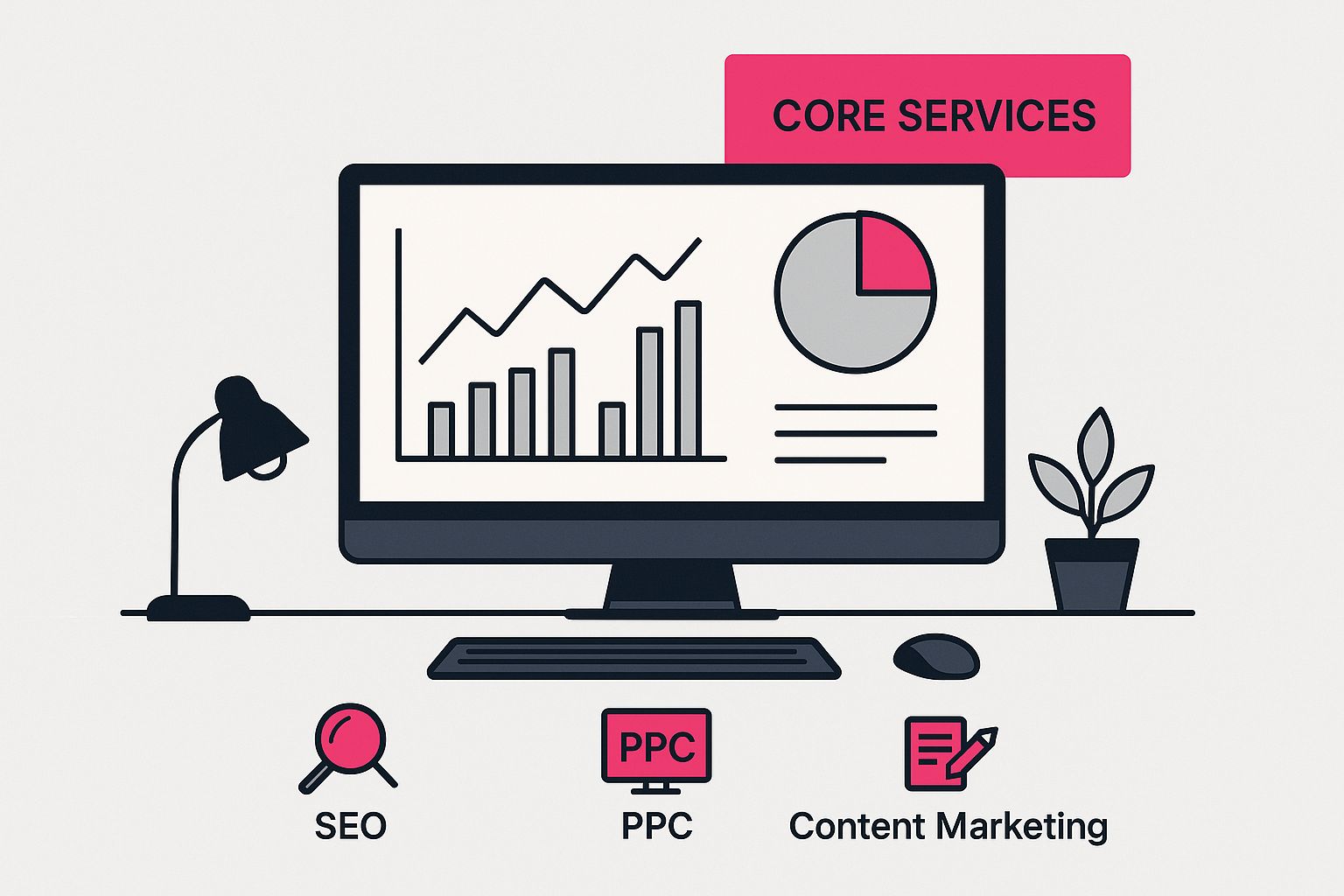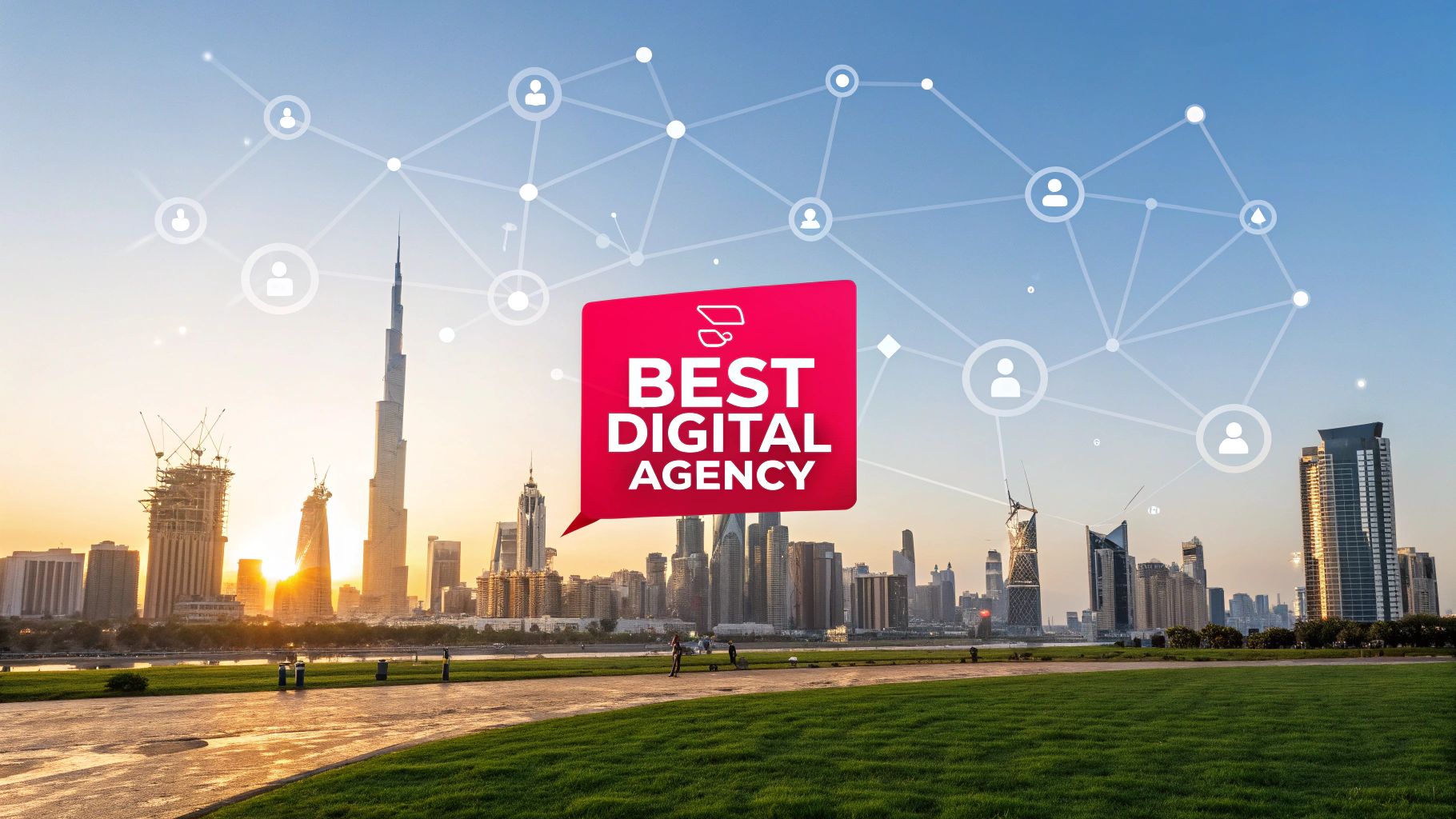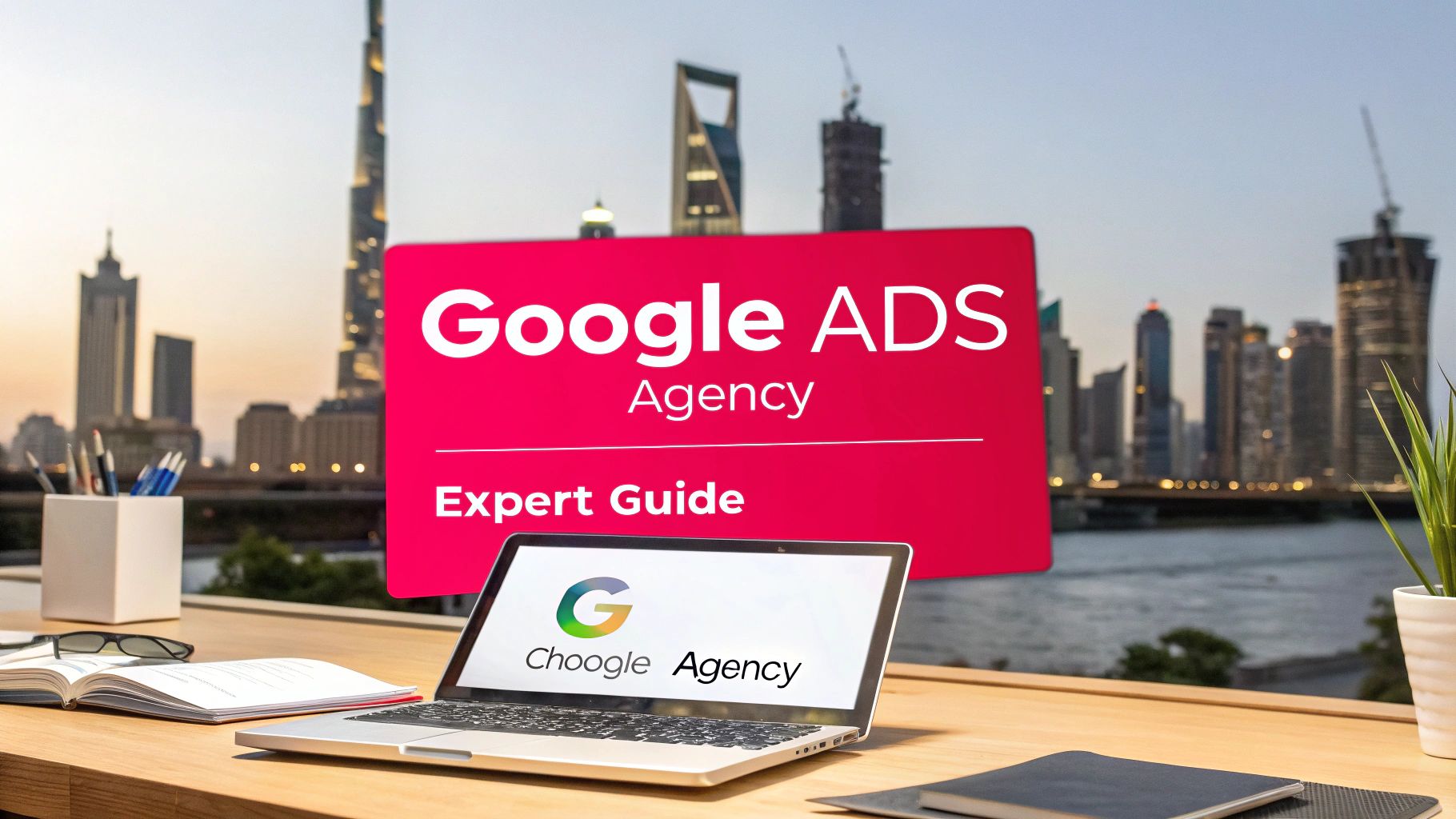Ever wondered what a digital marketing company really does? In simple terms, they're a team of specialists hired to grow your business online. Their entire mission is to find your ideal customers, grab their attention, and turn them into loyal fans of your brand.
Think of them less like a hired service and more like a specialised extension of your own team. They bring a whole toolbox of advanced software and deep expertise that’s often too expensive or complex for a single business to manage on its own.
They’re the ones who keep up with the dizzying pace of online trends and algorithm changes, making sure your brand doesn't just keep up, but actually gets ahead. This frees you up to do what you do best: run your business.
What a Digital Marketing Company Actually Does
A digital marketing agency doesn't just handle your social media posts or run a few ads. They step in as a strategic partner, translating your core business goals—like "we need to increase sales by 20%"—into a concrete, actionable marketing plan.
Their job is to build and manage a complete growth strategy from the ground up, all based on a deep dive into your brand, your industry, and your customers.
A Strategic Growth Partner
So, what does that strategic work look like in practice? It usually boils down to a few key things.
- Figuring Out Your Goals: First, they sit down with you to understand exactly what you want to achieve. Is it more online sales? A flood of new leads for your sales team? Or maybe just getting your name out there?
- Deep-Diving into Your Audience: Next, they play detective. They figure out who your perfect customers are, where they hang out online, and what kind of messages will actually make them stop scrolling.
- Spying on the Competition: The agency will take a hard look at what your competitors are doing right—and wrong. This helps them spot gaps in the market and find opportunities for your brand to shine.
- Building Your Roadmap: With all this information, they create a customised marketing plan. This isn't just a list of tasks; it's a detailed roadmap outlining which channels to use, the tactics to deploy, and a timeline for making it all happen.
A great agency doesn't just sell services; they provide a clear roadmap from where you are to where you want to be. They connect every marketing action directly to a business result, ensuring your investment delivers a tangible return.
Ultimately, a digital marketing company is both your guide and your get-it-done crew for everything online. Their success is tied directly to yours, making them a truly committed partner in your growth.
What Does a Digital Marketing Company Actually Do?
Think of a top-tier digital marketing company as a specialised team of experts, each with a distinct role, all working together to help your business grow online. They don't just sell you a list of services; they craft a unified strategy where every piece works in concert to hit your specific business goals.
Each service is a tool in their arsenal, carefully selected and combined to build a custom plan for your brand. While the exact mix can change depending on your needs, a handful of core services form the foundation of almost every successful digital campaign. Getting a handle on these pillars is the first step to understanding how a powerful, cohesive strategy comes to life.
This infographic gives a great visual breakdown of the primary services and how they all fit together.

As you can see, things like SEO, PPC, and content marketing aren't siloed activities. They’re interconnected gears in a much larger growth machine.
Search Engine Optimisation (SEO)
Search Engine Optimisation (SEO) is all about building a rock-solid, long-term foundation for your online presence. The goal is straightforward: when your ideal customer types a problem you can solve into Google, your website needs to be one of the first things they see.
This isn’t about quick tricks or shortcuts. It's a meticulous process of fine-tuning your website’s structure, content, and authority so that search engines see it as a valuable, trustworthy resource. A good agency handles the technical fixes, dives deep into keyword research, and builds high-quality backlinks to make it happen. Done right, SEO delivers a steady, organic stream of relevant traffic to your site, month after month.
Pay-Per-Click (PPC) Advertising
While SEO is the long game, Pay-Per-Click (PPC) advertising gets you in front of customers right now. Imagine being able to place your business at the very top of Google's search results tomorrow. Or running laser-targeted ads on social platforms like Instagram and LinkedIn. That’s PPC.
You pay a small fee every time someone clicks your ad, which makes it an incredibly controllable and measurable way to drive traffic and generate leads fast. An agency will manage your budget, design ads that grab attention, and constantly tweak campaigns to squeeze the most value out of every pound you spend.
This is more important than ever. Forecasts show the MENA region's total advertising revenue is set to hit $6.3 billion by 2025, with digital expected to make up nearly 66% of that. Mastering paid advertising is no longer optional.
Content Marketing
If SEO is the foundation and PPC is the accelerator, then Content Marketing is the fuel that powers the entire engine. This is the practice of creating and sharing genuinely useful content—think blog posts, videos, and in-depth guides—to attract and hold the attention of your target audience.
Content is the currency of trust online. It's how you answer your audience's questions, solve their problems, and establish your brand as a credible authority in your industry long before they are ready to make a purchase.
Great content is also a huge boost for your SEO, as it naturally targets important keywords and earns valuable links from other sites. Plus, it gives you the raw material you need for your social media channels and email newsletters, making it a central pillar that supports everything else you do.
To help clarify how these services fit together, here’s a quick overview of what each one aims to achieve and how success is measured.
Core Digital Marketing Services at a Glance
| Service | Primary Objective | Common KPIs |
|---|---|---|
| SEO | Increase organic visibility and drive long-term, qualified traffic. | Keyword Rankings, Organic Traffic, Backlink Profile |
| PPC Advertising | Generate immediate traffic, leads, and sales through paid ads. | Click-Through Rate (CTR), Cost Per Click (CPC), Conversion Rate |
| Content Marketing | Build brand authority, trust, and audience engagement. | Website Traffic, Time on Page, Social Shares, Lead Generation |
| Social Media | Grow and engage a community around the brand. | Follower Growth, Engagement Rate, Reach, Website Clicks |
| Email Marketing | Nurture leads, retain customers, and drive repeat business. | Open Rate, Click-Through Rate (CTR), Conversion Rate |
This table shows that while each service has its own focus, their goals and metrics often overlap and support one another.
Social Media and Email Marketing
Social Media Marketing is about building a tribe around your brand. It goes way beyond just posting updates. It’s about starting conversations, building genuine relationships, and guiding your followers from casual interest to loyal customers. An agency will map out a content calendar, manage community interactions, and run campaigns to grow your following.
Finally, Email Marketing is still one of the most powerful tools for nurturing leads and keeping customers happy. By sending personalised messages straight to someone's inbox, you can guide them along their buying journey and encourage repeat business. It's a direct line to your audience that you own, completely independent of any algorithm changes on other platforms.
When woven together by a skilled team, these services create a powerful system for sustainable growth. For a more detailed look at how these elements are combined into a comprehensive strategy, you can explore our full overview of services in digital marketing. A great digital marketing company knows exactly how to blend these disciplines, ensuring each one amplifies the others for maximum impact.
The Real Pay-Offs of Partnering with an Agency

Bringing a digital marketing company on board is far more than just offloading a few tasks. Think of it as a strategic move—an investment in growth, efficiency, and deep-seated expertise. The real value isn't just in the services they provide, but in the very real, business-changing benefits that come from a dedicated partnership. It’s about shifting your mindset from seeing marketing as a cost centre to recognising it as a powerful engine for revenue.
This kind of partnership lets your team get back to what they do best: innovating, running the business, and taking care of your customers. When you hand over the ever-changing complexities of online marketing, you reclaim precious internal resources and gain an ally whose success is directly tied to yours.
You Get a Full Specialist Team, Instantly
Let's be realistic: building a top-notch, in-house marketing team is a huge financial undertaking. To match what even a small agency offers, you'd need to hire an SEO analyst, a content writer, a PPC manager, a social media pro, and a strategist. The time spent on recruitment and the combined salary costs can be staggering.
Working with an agency gives you immediate access to that entire roster of specialists for a single, predictable fee. You get the benefit of diverse, senior-level talent without the high overheads of salaries, benefits, and training.
An agency is essentially a full marketing department on demand. You're not just hiring one person; you're gaining the collective wisdom of multiple experts who live and breathe their disciplines, all working together on your specific goals.
This model isn't just about saving money; it's also about agility. An agency can dial its efforts up for a big product launch or scale back during a quieter period, offering a level of flexibility that’s nearly impossible to achieve with a fixed in-house team.
Access to Advanced Tools Without the Hefty Price Tag
Modern marketing runs on sophisticated—and often very expensive—technology. Professional tools for SEO analytics from platforms like Semrush or Ahrefs, competitor research, marketing automation, and social media management can easily cost thousands of pounds every month.
A good digital marketing company has already made those substantial investments in enterprise-level software. By partnering with them, you get to reap the rewards of this powerful tech stack without bearing the direct cost. It gives you access to data and capabilities that would otherwise be out of reach for many businesses.
This isn't just a small perk; it leads to smarter, more effective campaigns. With better data and more powerful tools, an agency can:
- Dig Up Deeper Insights: Find out exactly what your customers are searching for and see what your competitors are up to behind the scenes.
- Sharpen Your Targeting: Reach your ideal audience with laser-focused ad campaigns, which means less wasted money.
- Automate and Optimise: Use advanced platforms to nurture leads and analyse performance far more efficiently than manual methods allow.
This access levels the playing field, empowering smaller businesses to compete effectively against much larger corporations.
Achieve a Higher Return on Your Investment
At the end of the day, what matters most is the Return on Investment (ROI). A professional agency isn't just checking off tasks on a list; they are building and constantly refining a strategy designed to make you money. Their experience helps them sidestep common pitfalls and expensive mistakes that can quickly drain a marketing budget with little to show for it.
They zero in on the metrics that actually impact your bottom line—like Customer Acquisition Cost (CAC) and Return on Ad Spend (ROAS)—not just vanity metrics that look good on paper. Because they've worked with countless clients, often in your very industry, they already have a strong sense of what works. This experience means they can allocate your budget to the channels and tactics most likely to deliver tangible results, like qualified leads and actual sales.
This focused, data-driven approach ensures every pound you spend is an investment in measurable growth. By tapping into their expertise, tools, and strategic focus, a digital marketing company simply makes your marketing budget work harder and smarter for your business.
How to Choose the Right Digital Marketing Partner
Picking a digital marketing company is one of the biggest moves you can make for your business. This isn't just about outsourcing a task; it's about finding a partner who becomes an extension of your own team. The right agency gets your goals, buys into your vision, and has the chops to turn that vision into real, measurable growth.
But how do you find "the one"? It takes a clear-headed approach. You have to look past the slick sales pitches and dig into what a potential agency can actually do for you. By being methodical, you can separate the true experts from the talkers and find a team that's genuinely invested in your success.
Assess Their Portfolio and Proven Results
The best predictor of future success is past performance. A solid agency will be excited to show you what they’ve accomplished. When you review their portfolio and case studies, don't just skim the surface.
Look for proof that they’ve delivered real results for businesses like yours—either in your industry or facing similar hurdles. A pretty website is nice, but a case study showing a 50% increase in qualified leads or a 70% boost in organic traffic tells a much better story.
Pay close attention to the data. Vague claims like "we boosted engagement" are a red flag. You want to see specific numbers, clear timelines, and an explanation of the strategy that got them there. That’s the sign of a results-driven team.
Evaluate Communication and Transparency
There's nothing worse than an agency that goes dark for weeks, only to surface with a confusing report full of jargon. Good communication is everything. From your very first conversation, pay attention to how they talk with you.
Are they quick to respond? Are their answers clear? Most importantly, do they listen to you, or just bulldoze the conversation with a sales pitch? A great partner educates you along the way, explaining the "why" behind their recommendations.
Transparency in reporting is a deal-breaker. You should get regular, easy-to-digest reports that clearly connect their marketing efforts to your bottom line. If an agency gets cagey about showing you performance data and ROI, walk away.
This kind of open, honest communication builds the trust you need for a true partnership, making it a collaborative effort instead of just a transaction.
Understand Their Strategic Approach
A menu of services isn't a strategy. Any agency can sell you SEO or social media management. A true partner, however, starts by getting to know your business inside and out before they even suggest a tactic.
In those initial meetings, your job is to figure out how they think. Ask them point-blank how they would tackle your specific challenges. You’re looking for a thoughtful, customised answer, not a canned, one-size-fits-all plan. A great agency will ask you sharp questions about your customers, your competitors, and your biggest goals.
When you're vetting potential agencies, it's also smart to know what to ask about modern challenges; these 10 AI Questions To Ask Your SEO Agency can reveal how prepared they are for the future. An agency that isn't thinking about these things is already behind.
To make sure you're working with a strategic partner, a checklist can be incredibly helpful. Before you sign anything, take the time to sit down with a potential agency and ask some direct questions. This helps you understand their process, their transparency, and how they define success.
Essential Questions to Ask a Potential Agency Partner
| Area of Inquiry | Key Question to Ask | What to Listen For in the Answer |
|---|---|---|
| Strategy & Onboarding | "What does your onboarding process look like, and how will you get up to speed on our unique business and goals?" | A detailed, multi-step process. They should talk about discovery calls, competitor analysis, and audience research—not just taking your order. |
| Performance & KPIs | "How do you measure success, and how will you connect your marketing efforts directly to our business objectives, like leads or sales?" | Specific metrics (KPIs) like Cost Per Acquisition, Conversion Rate, and ROI. Avoid vague answers like "more traffic" or "brand awareness." |
| Communication & Reporting | "What can we expect for reporting frequency and format? Can we see a sample report?" | A clear schedule (weekly, bi-weekly, monthly) and a commitment to easy-to-understand reports with analysis and next steps, not just data dumps. |
| Team & Expertise | "Who, specifically, will be working on our account, and what is their experience?" | Direct answers. You want to know if you'll be working with senior strategists or handed off to a junior account manager. |
| Flexibility & Contracts | "What are your contract terms? Is there a trial period or an initial short-term commitment?" | Look for flexibility. A 90-day initial term is reasonable. A mandatory 12-month lock-in from day one is a red flag. |
By asking these questions, you’re not just interviewing an agency; you’re starting a partnership on the right foot—with clarity and shared expectations. A good partner will welcome this level of detail.
Watch Out for Common Red Flags
Finally, being able to spot a bad fit is just as crucial as finding a good one. Some promises and practices should set off alarm bells immediately.
The classic red flag is the promise of "guaranteed #1 Google rankings." SEO is far too complex and unpredictable for anyone to ethically make that guarantee. Another major warning sign is a lack of transparency. If they won’t give you full access to your own analytics accounts, run. It's your data, after all.
Also, be cautious of agencies that try to lock you into long, rigid contracts right away or have confusing pricing structures. A confident partner will be upfront about costs and flexible enough to prove their value before demanding a long-term commitment. A great partnership for organic growth, for instance, often comes from a specialised https://grassrootscreativeagency.com/search-engine-optimization-company/ that focuses on building a solid foundation first.
The Technology Powering Modern Marketing Agencies

Behind every great digital marketing campaign, there’s a powerful collection of technology doing the heavy lifting. A top-tier agency doesn't just run on creativity; it invests heavily in enterprise-level software that gives its clients a serious competitive edge. This "tech stack" is the engine that drives strategy, efficiency, and ultimately, your results.
Think of it like building a house. You could try to do it with basic hand tools, or you could bring in professional-grade power tools that get the job done faster, more accurately, and with a much better finish. Agencies choose the power tools. This gives them capabilities that are often too expensive or complex for a single business to buy and manage on its own.
The Core Tech Stack Explained
The software a modern agency uses is way more than just a social media scheduler. It's a whole ecosystem of interconnected platforms built for deep analysis, smart automation, and continuous optimisation. Each tool has a specific, vital role to play.
Here are the key categories that form the backbone of an agency's toolkit:
- Data Analytics Platforms: These are the agency's eyes and ears. They dig through mountains of data to uncover who your customers really are, track how people behave on your website, and monitor campaign performance as it happens.
- Advanced SEO Tools: This is the secret sauce for ranking high on Google. This software lets agencies track thousands of keywords, peek at competitors' strategies, and run deep technical health checks on your website to please search engine algorithms.
- Marketing Automation Software: These platforms are masters of nurturing leads without burning out your team. They can send personalised email sequences, guide customers through complex buying journeys, and score leads based on their activity, so your sales team only talks to the warmest prospects.
This investment in technology is a huge part of the value an agency brings to the table. When you partner with one, you get all the benefits of this entire toolkit without the massive price tag.
Unlocking a Competitive Advantage
Having access to premium tools isn't just about convenience; it's a real strategic advantage. It allows a digital marketing company to work with a level of precision that’s almost impossible to match with an in-house team. Staying ahead means using the latest software, like the best tools for agencies to analyze Instagram Reels.
The right technology transforms marketing from a guessing game into a data-driven science. It allows agencies to make smarter decisions, automate tedious tasks, and spend more time on the high-level strategy that actually grows your business.
The market itself reflects this shift. In 2024, the digital marketing software market in the Middle East was valued at around USD 3.89 billion and is projected to hit USD 12.39 billion by 2033. This explosion shows just how much businesses now rely on powerful software to make sense of their data and run effective campaigns.
When you hire an agency, you’re not just hiring people. You’re gaining access to the sophisticated technology they use to deliver incredible results.
Measuring Success and Understanding Your ROI
When you bring a digital marketing company on board, you're making a real investment. So, how do you actually know if it's paying off? The true measure of success isn't found in flashy numbers like social media likes or follower counts. Real value lies in the data that directly affects your bottom line.
A good agency knows to look past those "vanity metrics" and zero in on what truly drives your business forward. They connect every single action—whether it’s launching an ad campaign or writing a blog post—to tangible results. This means focusing on key performance indicators (KPIs) that tell a clear story about growth and profit.
Key Metrics That Actually Matter
To get a real sense of your progress, your agency should be tracking and reporting on specific, meaningful data. These are the numbers that give you a clear window into how your marketing budget is performing and if the strategy is hitting the mark.
Here are three of the most important KPIs to watch:
-
Customer Acquisition Cost (CAC): This is the total cost of your marketing efforts divided by the number of new customers you've brought in. A low CAC is a great sign—it means your agency is efficiently turning your investment into new business.
-
Conversion Rate: This metric tracks the percentage of people who take a specific action you want, like buying a product or filling out a contact form. When this number goes up, it means your messaging and strategy are really clicking with your audience.
-
Return on Ad Spend (ROAS): If you're running paid ads, this is the ultimate scoreboard. It calculates exactly how much revenue you’re generating for every pound spent on advertising, giving you a direct look at profitability.
A quality digital marketing company doesn't just use these figures to show you what happened last month; they use them to actively fine-tune their strategy for the future. For a closer look at this, check out our guide on essential marketing performance indicators.
The Importance of Transparent Reporting
A great agency partner won’t just email you a spreadsheet full of numbers and call it a day. They provide clear, easy-to-understand reports that tell a story. They’ll walk you through what the data means, celebrate the wins, and be upfront about what isn't working—and what they're going to do about it.
Transparent, data-driven reporting is the foundation of a strong agency partnership. It transforms marketing from a mysterious expense into a predictable, measurable engine for business growth, demonstrating clear value every step of the way.
This focus on precise measurement is more critical than ever. The digital marketing analytics market in the Middle East is exploding, projected to jump from USD 90.36 million in 2024 to USD 322.43 million by 2025. This growth is fuelled by businesses demanding to see a clear return on their investment. You can find more on this trend at Cognitive Market Research.
Ultimately, this data-first approach ensures every decision is geared toward getting better, turning insights into stronger results and a healthier ROI for your business.
Frequently Asked Questions
Even after you're sold on the idea, it's completely normal to have some nitty-gritty questions before you sign on the dotted line. Getting these final details ironed out is what helps you make a smart, confident decision for your business. Let's tackle some of the most common questions we get from business owners just like you.
Our goal here is to give you the clarity you need, covering everything from what to budget and for how long, to what your team's role in all of this will look like.
How Much Does a Digital Marketing Company Cost?
There’s no one-size-fits-all price tag. The cost really depends on what you need, what your goals are, and the agency’s level of expertise. Most digital marketing companies work on a monthly retainer, which could be anywhere from a few thousand to tens of thousands of pounds a month.
A small local business might kick things off with a focused SEO or social media plan. A larger company, on the other hand, will likely need a comprehensive strategy across multiple channels. The important thing is to find an agency with transparent pricing that directly connects what you pay to the work they do and the results you get. Think of it less like a monthly bill and more like an investment in your company’s growth.
What Are Typical Contract Lengths?
You might find some agencies that offer month-to-month contracts, but an initial agreement of three to six months is far more common. And for good reason. Many of the most powerful strategies, especially SEO and content marketing, simply need a few months to build momentum and start delivering real, measurable results.
A three-month initial term is a great starting point. It gives the agency enough time to get their strategy up and running and show you some tangible progress. At the same time, it gives you the flexibility to see if it's the right fit before locking into a longer-term partnership.
After that initial phase, contracts usually shift to a rolling monthly plan or a longer annual agreement, depending on how things are going and what works best for you.
What Does the Onboarding Process Involve?
A solid, thorough onboarding process is a tell-tale sign of a professional agency. It almost always kicks off with a deep-dive discovery session. This is where the agency becomes a student of your business—they’ll want to understand everything about your customers, your competition, and exactly what you want to achieve.
From there, they'll dig into technical audits, get your analytics and reporting dashboards set up, and finalise the strategic plan. This early stage is crucial for getting everyone on the same page and making sure the campaign starts strong. A good partner will walk you through every step, making it feel like a true collaboration right from the get-go.
Ready to see how a dedicated strategy can grow your business? At Grassroots Creative Agency, we build data-driven marketing plans that deliver real results. Get in touch with us today to start the conversation.








